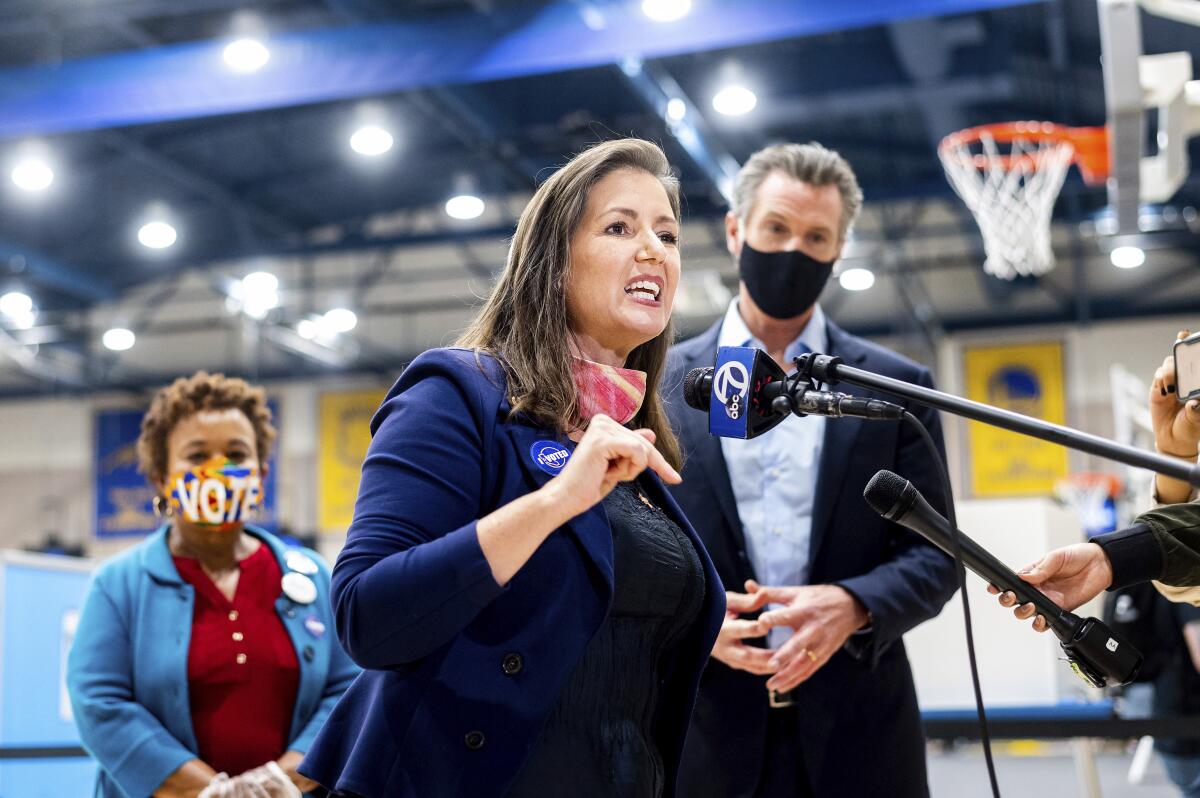Column: It’s a guaranteed income program, but think of it as a test case for reparations

- Share via
The last time I spoke with former guaranteed income guru Michael Tubbs, he was excitedly explaining just how many cities in how many states were clamoring to give a few hundred bucks a month to a few hundred of their residents — no strings attached.
“We’re probably at like 20 to 25 states now,” said the former mayor of Stockton and co-founder of Mayors for a Guaranteed Income. “I’ve got to find some mayors in Montana, North Dakota, South Dakota, Wyoming.”
Indeed, the announcements about new guaranteed income programs have become almost routine, especially in California, where about half a dozen cities have adopted them. Marin County is the latest.
But there is nothing routine about what Oakland just announced.
On Tuesday, Mayor Libby Schaaf, flanked virtually by Tubbs, said that her Bay Area city would soon start giving out $500 a month to 600 residents for at least 18 months.
Like a lot of cities, the recipients must be poor and have at least one child to qualify. Specifically, they must have an annual household income of no more than $59,000 for a family of three — or roughly 50% of the median income — and half of the recipients will be selected from households that pull in less than $30,000 a year.
The guaranteed income pilot program will distribute funds for six months to 130 eligible artists.
But unlike a lot of cities, the recipients also must be Black, Indigenous or otherwise identify as a person of color to qualify.
“Our vision is an Oakland that has closed the racial wealth gap and where all families thrive,” Schaaf explained in a statement. “We believe that guaranteed income is the most transformative policy that can achieve this vision.”
Or as she told the Washington Post: “There are huge gaps between people of color and our white residents. With the limited resources of this pilot, we would like to understand better how we can understand these disparities as well as address overall poverty.”
The median income for white households in Oakland is three times higher than it is for Black households, to be exact.
That the city is using guaranteed income to address such disparities means its program will be something of a test case — not only to demonstrate the benefits of government providing money to poor Americans in general, but of government providing it to Black people more specifically.

In some ways, it’s not that far off from providing Black Americans with financial reparations for slavery — an idea that, until fairly recently, had gone absolutely nowhere politically.
Not that paying reparations is a new concept for the U.S. government. In 1988, for example, Congress agreed to pay $20,000 each to the nearly 62,000 survivors of the Japanese American internment camps and residents of the Aleutian Islands who were relocated during World War II. Then-President Reagan signed the bill.
But, today, Republicans are more skeptical when it comes for reparations for Black Americans. In the dour words of then-Senate Majority Leader Mitch McConnell in 2019, “I don’t think reparations for something that happened 150 years ago for whom none of us currently living are responsible is a good idea.”
He was commenting on H.R. 40, legislation that Rep. John Conyers of Michigan introduced every year from 1989 until he died in 2019. I can count on one hand the number of times it even had a hearing, although all the bill would do is create a federal commission to study reparations and the harms done to Black Americans over the centuries.
Prompted by the inaction at the federal level, Shirley Weber, then an Assembly member from San Diego and now California secretary of state, introduced Assembly Bill 3121 last year.
Get the latest from Erika D. Smith
Commentary on people, politics and the quest for a more equitable California.
You may occasionally receive promotional content from the Los Angeles Times.
Signed into law after a summer of protests against racial injustice and police brutality, it authorized a new task force to examine the lasting consequences of slavery, including disparities linked to wealth, housing, education, employment, health and incarceration. The task force also will recommend strategies for making amends, whether it’s direct payments to Black people or targeted investments in institutions, and answer the thorniest of question of all: Who should be eligible?
“California has come to terms with many of its issues, but it has yet to come to terms with its role in slavery,” Weber said last fall. “We’re talking about really addressing the issues of justice and fairness in this country that we have to address.”
The task force begins meeting in June.
Whatever data are available from Oakland’s guaranteed income program — and hopefully, there will be carefully compiled data — should be considered by the members.
Even without taking race into account, research from Stockton’s program showed that those who received monthly payments used the money to meet their basic needs and were generally happier and healthier without the stress of trying to make ends meet while in poverty.
Republicans argue that welfare “entitlements” under the American Rescue Plan will lead to laziness. Stockton’s guaranteed income program proves otherwise.
So should whatever data become available from Evanston, Ill., which this week approved the nation’s first reparations program, available to Black residents who can prove they or their families lived in the city between 1919 and 1969.
The Chicago suburb plans to spend $10 million over 10 years, mostly using tax money from cannabis sales. The first $400,000 will be paid as compensation for discriminatory housing practices, with grants of up to $25,000 available for home repairs, down payments, and interest or penalties on property in the city.
Thanks to data from Stockton, we’ve already seen what a guaranteed income can do for the poorest Americans. Schaaf is right when she says Oakland’s program can “help undo centuries of economic and racial injustice.”
But reparations advocates are also right when they say that poor Black people aren’t the only ones who have been harmed by generations of systemic racism.
“The danger is in limiting the scope to Black people who are within a certain financial bracket,” said Brandon Greene, director of the Economic Justice Program for ACLU of Northern California. “Reparations shouldn’t have anything to do with what my financial bracket is.”
This is why, with H.R. 40 reintroduced this year by Rep. Sheila Jackson Lee of Texas and the Biden administration publicly backing it, it’s time to study reparations at the federal level too. California can’t do everything.
More to Read
Get the latest from Erika D. Smith
Commentary on people, politics and the quest for a more equitable California.
You may occasionally receive promotional content from the Los Angeles Times.













